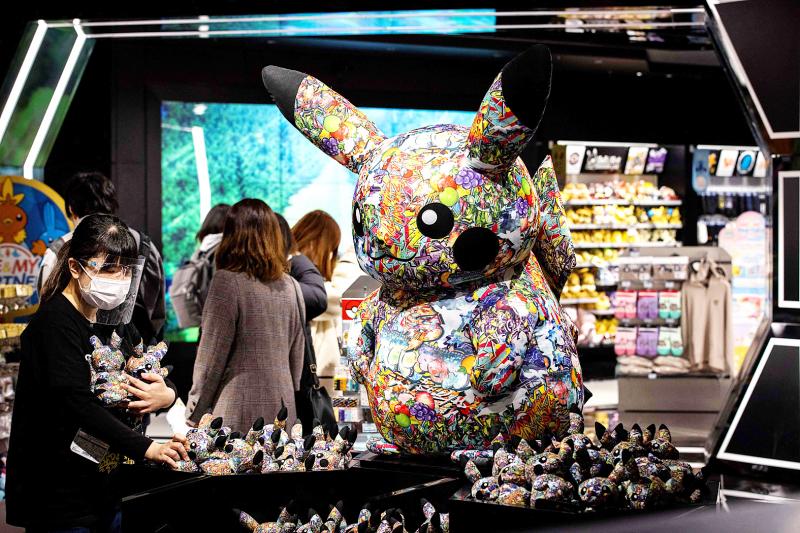Japanese games giant Nintendo Co is teaming up with the US firm behind runaway hit Pokemon Go to develop augmented reality (AR) smartphone games, the two companies said yesterday.
Their first joint venture is to involve Nintendo’s lovable half-vegetable, half-animal Pikmin characters in a game expected to launch sometime this year.
AR technology allows images and animations to be superimposed on the real-world view seen on a smartphone’s rear camera.

Photo: AFP
It was crucial to the success of Niantic Inc’s Pokemon Go, which thrilled users around the world with the appearance of Pokemon characters in their neighborhoods across the globe.
“Niantic’s AR technology has made it possible for us to experience the world as if Pikmin are secretly living all around us,” Nintendo representative director Shigeru Miyamoto said in a news release.
Miyamoto, creator of Pikmin and other famed Nintendo characters, including Super Mario and Donkey Kong, said that the new app would be designed around “making walking fun.”
Nintendo had in the past been reluctant to let its characters venture outside traditional consoles and into the increasingly popular world of smartphone gaming.
However, in recent years, it has released a string of mobile titles, including 2016’s Super Mario Run and 2019’s Mario Kart Tour.
“The deal could help address complaints among investors that Nintendo hasn’t been able to earn much from smartphone apps,” Ace Research Institute analyst Hideki Yasuda said.
“As we continue to expand our games portfolio, it was a natural next step to team up with Nintendo,” Niantic CEO John Hanke said in a joint news release.
“We’re looking forward to shaping the future of AR together,” he added, without offering details on which other Nintendo characters might be in line for AR games.
Pokemon Go has been hugely successful since its 2016 launch, earning more than US$1 billion dollars in the first 10 months of last year alone, tracker Sensor Tower said.

RECYCLE: Taiwan would aid manufacturers in refining rare earths from discarded appliances, which would fit the nation’s circular economy goals, minister Kung said Taiwan would work with the US and Japan on a proposed cooperation initiative in response to Beijing’s newly announced rare earth export curbs, Minister of Economic Affairs Kung Ming-hsin (龔明鑫) said yesterday. China last week announced new restrictions requiring companies to obtain export licenses if their products contain more than 0.1 percent of Chinese-origin rare earths by value. US Secretary of the Treasury Scott Bessent on Wednesday responded by saying that Beijing was “unreliable” in its rare earths exports, adding that the US would “neither be commanded, nor controlled” by China, several media outlets reported. Japanese Minister of Finance Katsunobu Kato yesterday also

Taiwan’s rapidly aging population is fueling a sharp increase in homes occupied solely by elderly people, a trend that is reshaping the nation’s housing market and social fabric, real-estate brokers said yesterday. About 850,000 residences were occupied by elderly people in the first quarter, including 655,000 that housed only one resident, the Ministry of the Interior said. The figures have nearly doubled from a decade earlier, Great Home Realty Co (大家房屋) said, as people aged 65 and older now make up 20.8 percent of the population. “The so-called silver tsunami represents more than just a demographic shift — it could fundamentally redefine the

China Airlines Ltd (CAL, 中華航空) said it expects peak season effects in the fourth quarter to continue to boost demand for passenger flights and cargo services, after reporting its second-highest-ever September sales on Monday. The carrier said it posted NT$15.88 billion (US$517 million) in consolidated sales last month, trailing only September last year’s NT$16.01 billion. Last month, CAL generated NT$8.77 billion from its passenger flights and NT$5.37 billion from cargo services, it said. In the first nine months of this year, the carrier posted NT$154.93 billion in cumulative sales, up 2.62 percent from a year earlier, marking the second-highest level for the January-September

‘DRAMATIC AND POSITIVE’: AI growth would be better than it previously forecast and would stay robust even if the Chinese market became inaccessible for customers, it said Taiwan Semiconductor Manufacturing Co (TSMC, 台積電) yesterday raised its full-year revenue growth outlook after posting record profit for last quarter, despite growing market concern about an artificial intelligence (AI) bubble. The company said it expects revenue to expand about 35 percent year-on-year, driven mainly by faster-than-expected demand for leading-edge chips for AI applications. The world’s biggest contract chipmaker in July projected that revenue this year would expand about 30 percent in US dollar terms. The company also slightly hiked its capital expenditure for this year to US$40 billion to US$42 billion, compared with US$38 billion to US$42 billion it set previously. “AI demand actually